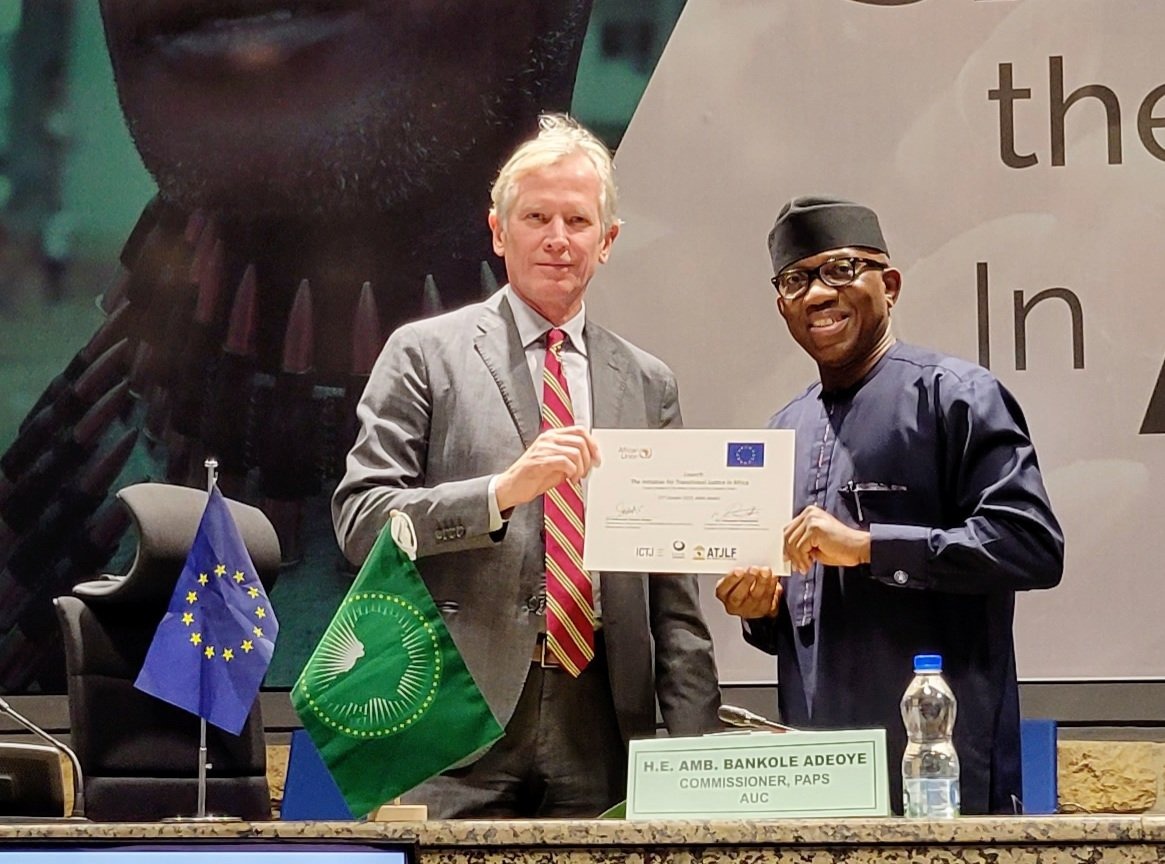|
Getting your Trinity Audio player ready...
|
Writes Baboloki Semele
The African Union (AU) and the European Union (EU) have formally inaugurated a comprehensive three-year project aimed at providing support to AU member states in their efforts to integrate the African Union Transitional Justice Policy (AUTJP) and embark on transitional justice initiatives at the national level. The project, titled the Initiative for Transitional Justice in Africa (ITJA), is being coordinated by a consortium of three distinguished organizations, spearheaded by the International Center for Transitional Justice (ICTJ), the African Transitional Justice Legacy Fund (ATJLF), and the Centre for the Study of Violence and Reconciliation (CSVR). The EU has generously allocated a total of €5 million in funding for this initiative.
The launch event of the ITJA successfully convened government officials, policymakers, transitional justice practitioners, representatives from civil society, and other key stakeholders. The objective of the gathering was to review the foundational components of ITJA and inspire active involvement in the project’s activities. Strategic collaboration among these stakeholders is deemed vital for the advancement of transitional justice across the African continent.
Ambassador Bankole Adeoye, AU Commissioner for Political Affairs, Peace, and Security, emphasized the critical importance of promoting transitional justice in his opening remarks, stating, “We have no other choice than to push and promote transitional justice. Categorically, without it, conflicts will not be permanently resolved in Africa. It is necessary that we invest in transitional justice and accountability mechanisms to ensure that reconciliation and dialogue are the way to go. The effort being made under this initiative to train more people, especially youth and women, on transitional justice issues will be a great asset for the union as it will result in having an array of actors who will act in various capacities at sub-national, national, regional, and continental levels while promoting transitional justice.”
H.E. Roland Kobia, European Union Ambassador to Ethiopia and Chargé d’Affaires a.i, European Union Delegation to the African Union, highlighted the significance of democratic governance, justice, and accountability as crucial pillars for conflict prevention and resolution. He expressed the EU’s delight in supporting the AU Transitional Justice Policy and its member states, emphasizing the strong partnership between the African Union and the European Union.
Adopted in February 2019, the AUTJP offers AU member states comprehensive guidance for establishing and implementing effective and credible transitional justice processes. The AU Commission has developed an accompanying roadmap that outlines actionable steps for putting the policy into practice. Grounded in African values and informed by best practices, lessons learned, and international norms, the AUTJP and its roadmap articulate a distinctively African approach to designing, implementing, monitoring, and assessing transitional justice mechanisms.
The AUTJP signifies a pivotal step in addressing the legacies of human rights violations, providing redress to victims, and upholding their dignity. Annah Moyo, CSVR’s Executive Director, remarked, “The policy promises to usher in an era of peace, justice, reconciliation, social cohesion, and healing across the diverse societies of Africa. However, its efficacy lies in the ability of AU member states to carry it out.”
The ITJA has been established with the primary aim of assisting stakeholders at both the national and local levels as they put the AUTJP and its roadmap into action. The initiative offers technical support and capacity building to AU member states, relevant AU entities, and Regional Economic Communities in designing and executing tailored, gender-sensitive transitional justice mechanisms. It also encourages research and knowledge production and management related to transitional justice experiences in Africa. Furthermore, the ITJA raises awareness about the AUTJP and enhances the engagement of civil society and victims’ groups with both the policy and transitional justice processes on the continent.
Numerous African countries continue to grapple with recurrent violent conflicts and unresolved legacies of extensive human rights violations, hindering sustainable peace and development. Anna Myriam Roccatello, ICTJ’s Deputy Executive Director and Director of Programs, stated, “Historical socioeconomic inequality and marginalization, compounded by pervasive gender discrimination, exclusion of young people, and xenophobia, have led to social unrest, violence, and human rights violations in some countries across the globe. These are the root causes of conflict and atrocities. Transitional justice principles and initiatives, however, can help society finally address these causes and create the conditions for lasting peace and prosperity.”
Hence, the ITJA is of paramount importance as it extends critical technical and other forms of support to member states currently navigating or preparing to initiate transitional justice processes. It further empowers local and national civil society actors, including victims’ groups, women’s organizations, and youth groups, to significantly contribute to shaping, participating in, and monitoring these mechanisms. By doing so, these processes can more effectively address the needs of victims and work towards preventing future conflict and the recurrence of abuses.






